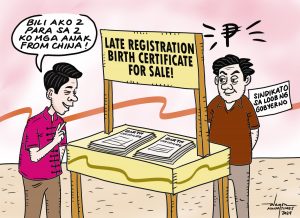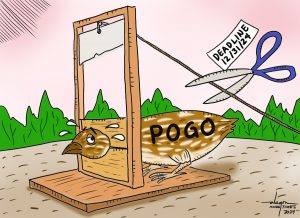After Mayor Sara Duterte-Carpio announced the cancellation of almost all of the activities of the Araw ng Davao celebration in the light of the problems with the spread of the COVID-19 virus, General Santos City and the Province of Bukidnon followed suit with the cancellation of the Kalilangan and Kaamulan festivals, respectively.
There have been those who asked if this could be done particularly because businessmen and other people have already invested funds purposely for business activities during these festivals, expecting to earn profits from such investments.
People have asked if the government can do this at the expense of such investments.
From the questions I have read and heard, the people asking are actually talking about the constitutional guarantee against impairment of contracts. Specifically, Section 10 of Article III of the constitution provides that “No law impairing the obligation of contracts shall be passed.”
However, the fact is that the valid exercise of police power necessarily trumps, or supersedes, the non-impairment of obligations of contracts clause.
What is police power? Does it refer to the Philippine National Police?
Ahhh… Nope, this refers to the police power of the state, not the police organization, although the exercise of police power may involve the PNP as an implementing arm.
The police power of the state is defined as “the inherent power of a government to exercise reasonable control over persons and property within its jurisdiction in the interest of the general security, health, safety, morals, and welfare except where legally prohibited.”
Stated simply, private interests and property must give way to public interest whenever necessary. The government has the power to act in order to protect public or general welfare even if it is at the expense of some private concerns.
Public safety and public health are foremost among the justifications for the exercise of police power.
For example, cigarette companies and tobacco farmers must be losing a lot of money from the nationwide smoking ban in public places but this act of government is allowed because it is intended to minimize the health hazards of smoking and also to protect non-smokers from the deleterious effects of second-hand smoke.
On basis of protecting public morals, the Movie and Television Review and Classification Board is also an example of the exercise of police power by classifying movies and tv shows to determine what audiences should be allowed to watch them or if they should be allowed to be watched at all.
Producers of video content that is too risqué, or downright pornographic, risk the loss of their investment if the MTRCB deems their product to be unwatchable, all in the name of protecting public interest.
On the very matter at hand, it is clear that the intention behind the cancellation of the crowd intensive activities of the regional celebrations is to prevent the unnecessary gathering of large crowds which would necessarily exponentially increase the risk of spreading kind of viral infection.
Considering that our country is presently facing the threat of what is appearing to be a fast spreading viral infection that has already claimed over a thousand lives, preventing crowds is not only a reasonable precaution but even an outright necessity.
The situation we are in is one where, in the words of Star Trek’s indefatigable Spock, “The needs of the many outweigh the needs of the few or the one.”


